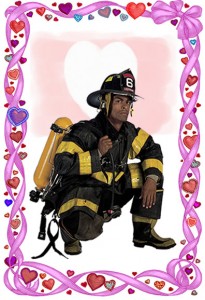Maintaining a Relationship with your SCBA
Posted on by Happy Valentine’s Day! Today is the day of the year dedicated to showing our significant others just how much we care. Boyfriends, girlfriends, husbands, and wives all scurry to make the day special with chocolates, flowers, romantic dinners, and thoughtful gifts. Why? Because good relationships take work. Good relationships take maintenance.
Happy Valentine’s Day! Today is the day of the year dedicated to showing our significant others just how much we care. Boyfriends, girlfriends, husbands, and wives all scurry to make the day special with chocolates, flowers, romantic dinners, and thoughtful gifts. Why? Because good relationships take work. Good relationships take maintenance.
Have you ever thought about your relationship with your personal protective equipment? For instance, the men and women, such as firefighters, who use Self-Contained Breathing Apparatus (SCBA) know that this device is their life partner of sorts—providing them with a breathable air source in the midst of hazardous environments. SCBA respirator users must be aware that problems with their device can arise if it is not properly maintained. Correct inspection, cleaning, upkeep, and service procedures are all vital to ensure optimum SCBA operation. Whether you are the user or the service technician of the SCBA, never assume that you know the best methods of carrying out these procedures. Unlike your human significant other, your respiratory partner comes with instructions to keep the relationship running smoothly. Pay close attention to the guidelines issued by the SCBA manufacturer for proper care and maintenance. (See the NIOSH/NPPTL User notice.)
Ever succeed at sweeping a potential partner off their feet with a romantic gesture, only to have it fail miserably when tried on another potential love interest? Each person is unique and must be approached differently… much like respirators. Maintenance procedures and training are unique to each respirator manufacturer and model. Additionally, any equipment changes to the original respirator configuration may entail new training and maintenance requirements. Manufacturers must include instructions for different configurations in the training and maintenance manual if an equipment modification impacts the use or maintenance of the respirator.
When in a relationship, it is important to understand the role you play. Some tips to improve the relationship between you and your SCBA include:
- conduct daily inspections of your SCBA
- be able to identify the signs that indicate an SCBA should be removed from service and examined by a certified technician (there are training courses to help you with this!)
- know which maintenance operations must be performed by trained and certified technicians as part of the manufacturer’s maintenance cycle instructions. (You wouldn’t want your dentist fixing your car!) These specific operations should only be performed by someone who has been trained and certified on the specific model.
You’ll be sure to get what you want if you effectively clean and sanitize your SCBA. This will help you avoid RTDs (i.e., respiratory transmitted diseases). Actually, even your employer has a role to play. Your employer is required to give you the training and help that you need to keep your relationship healthy.
But don’t make assumptions—follow the manufacturer’s instructions. If you do not have access to those instructions, check the manufacturer’s web site. If you still can’t find them, general cleaning and sanitizing guidance , applicable to many types of respirators, is provided by the Occupational Safety and Health Administration (OSHA). More specifically, NFPA 1852 Standard of Selection, Care and Maintenance of Open-Circuit Self-Contained Breathing Apparatus provides guidance that can be followed to ensure the continued efficient operation of SCBA.
Care and maintenance of your SCBA unit are vital steps to staying safe in the hazardous environments you face in your important job. The best Valentine’s Day present that you can give to your loved ones is coming home to them safe and sound.
Jaclyn Krah, MA
Ms. Krah is a Health Communication Specialist in the NIOSH National Personal Protective Technology Laboratory.
Posted on by

